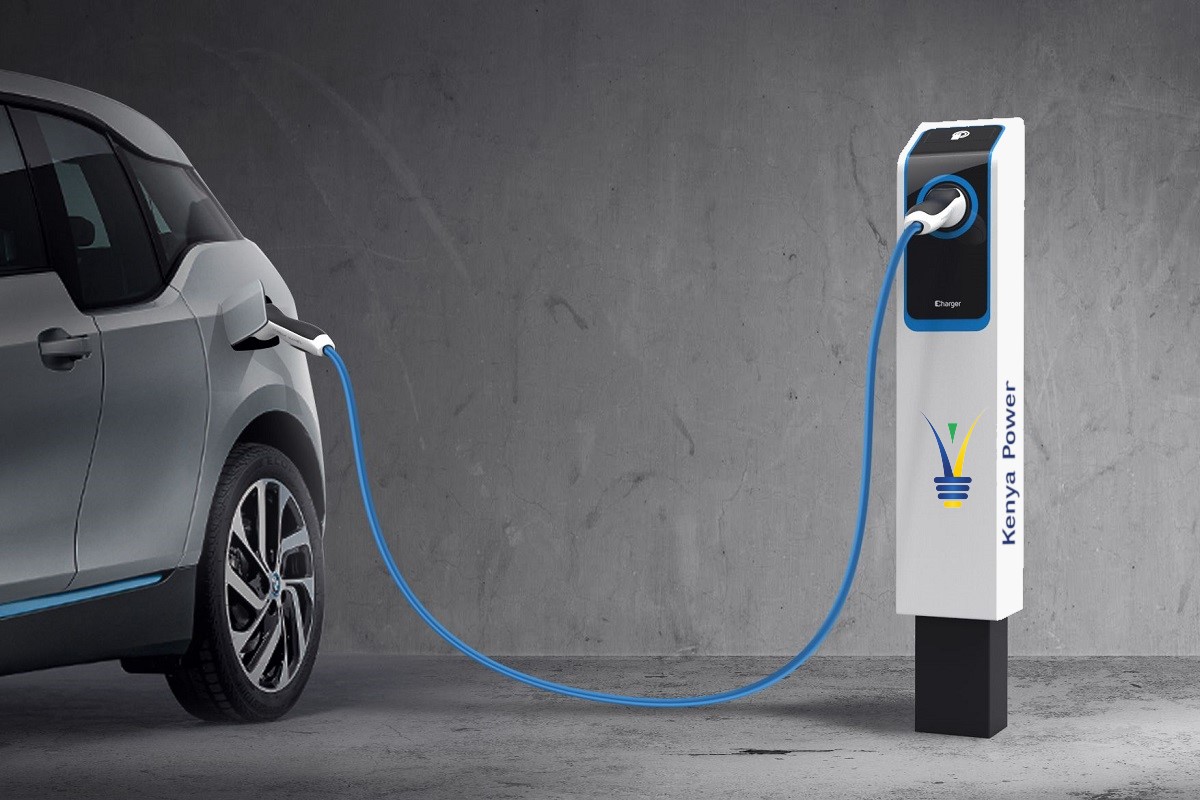Tech
Electric Cars in Kenya: A dream too big or is the future here?
Published
2 years agoon

The global transport sector is undergoing a transformation. With world leaders and stakeholders advocating for sustainability across all sectors, the transport industry, both regional and international, is embracing this shift.
While the uptake of clean transportation, such as electric and hybrid vehicles, is still in its early stages worldwide, particularly in Africa and notably in Kenya, the realization that change is inevitable is gradually becoming apparent to millions. With the Kenya Bus Service unveiling its first electric bus, the question is, is the future really here?
The Case for Electric Vehicles
The appeal of electric vehicles (EVs) is clear, offering numerous advantages for Kenya’s environmental and economic landscape. EVs emit no tailpipe pollutants, greatly contributing to the reduction of air pollution in urban areas. Air quality is a critical issue in Kenya, especially in Nairobi which reported PM2.5 air pollution has caused an estimated death of 500 lives since January 1, 2021. It has cost the city’s economy around US$78 million so far this year. Electric vehicles could significantly cut down on dangerous emissions such as nitrogen oxides and particulate matter, potentially improving public health and decreasing medical costs from air pollution-related diseases.
Electric vehicles also present an opportunity for Kenya to reduce its reliance on imported oil. The transport sector is a significant oil consumer, and volatile global oil prices can burden the national economy, you’ve seen how unstable fuel prices have been in the last couple of months. Transitioning to EVs allows Kenya to leverage its plentiful renewable resources, like solar and wind, for vehicle power generation, enhancing energy security and autonomy.
In terms of cost, electric vehicles may prove more economical over time. Although the initial investment for an EV might surpass that of a conventional petrol or diesel car, the operational expenses for EVs are considerably lower. They require less upkeep than internal combustion engines, and electricity typically costs less than petrol. Moreover, the Kenyan government’s interest in fostering electric mobility, through measures such as the Electric Vehicle Taskforce and potential tax benefits, indicates a strong commitment to facilitating the uptake of electric transportation.

The Roadblocks Ahead
Despite a positive outlook, several obstacles hinder the widespread adoption of electric vehicles (EVs) in Kenya. The primary challenge is the high initial cost. Although the long-term benefits of reduced fuel and maintenance costs are appealing, the upfront investment is a significant hurdle for many.
Another critical issue is infrastructure. A comprehensive charging network is vital for EV owners, yet Kenya is in the nascent stages of building such infrastructure. Additionally, range anxiety, the worry of depleting battery power, is a concern, particularly for those travelling beyond urban centres.
Moreover, the Kenyan electricity grid is already under pressure. The integration of a substantial number of electric vehicles may present further challenges to the grid’s capacity. The Kenya Power and Lighting Company (KPLC) continues to face challenges in meeting the power supply demands of Kenyans, with concerns that it may lack the capacity to support millions of electric cars. However, change is on the horizon, albeit gradually.
Balancing Dream and Reality
Bridging the gap between ambition and reality requires a comprehensive strategy. Government incentives like tax breaks and subsidies could make electric vehicles (EVs) more accessible. Critical to fostering consumer trust is the investment in charging infrastructure. Moreover, local EV assembly could lower expenses and generate employment opportunities.
Public awareness initiatives are also key in informing citizens about electric mobility’s advantages. Furthering research and development in battery technology is essential to address range concerns and decrease costs.
The journey towards broad EV adoption in Kenya is challenging, yet the potential benefits are significant. It presents a chance to purify our urban environments, diminish our carbon footprint, and forge a more sustainable future. The real question is not if electric cars are feasible, but rather how swiftly we can actualize this vision.
What are your thoughts on electric cars in Kenya? Are you optimistic about their future? Share your opinions in the comments below.
You may like


Spotify Has Quietly Hiked Prices in Kenya


Packed Fall 2024 Anime Lineup: What to Expect This Season


Infinix’s Hot Launch; The All New Hot 50 Series is Here


New WhatsApp Feature Lets You Mention Contacts In Status Updates


A Woman of Firsts by Edna Adan: A Story That Will Empower You To Face That Scary Decision You’ve Always Wanted To


Suicide Prevention Through Relatable Conversations
4 Comments
Leave a Reply
Leave a Reply

Spotify, the worldwide music streaming giant, has unexpectedly raised its subscription prices in Kenya. This change impacts all subscription levels, ranging from the economical Premium Mini to the extensive Family plan.
Spotify has just announced that it will raise the prices across all its subscription tiers in Kenya. This increase reflects how much one will have to pay to access premium features of the music streaming platform, with a new price change that applies to several user plans. This move is part of a wider trend within the streaming industry, where globally, these platforms inflate their prices in response to inflation and increased operational costs. Beginning today, users in Kenya will pay more to listen to their favorite music streaming services as Spotify continues to add more features and music to the platform.
The prices in Kenya have risen by 13.3 percent to 40.8 percent depending on the particular subscription. The wide range shows that some plans only have a moderate adjustment, while others see substantial rises. That is to say, many users are likely reviewing their current subscriptions or their more financially apt tiers. Specific reasons for these particular percentage increases have not been discussed, but this shows the platform’s intention: keeping profitability with competitive services.
Amongst the lot of subscription options, Premium Mini received the highest increase in percentage terms. The plan, previously the most affordable that gave access to Spotify’s premium features for either a day or a week, is now one of the relatively dearer options compared to other tiers. This steep increase may particularly affect users who rely on short-term premium access for occasional use and encourage them to either upgrade to longer-term plans or switch to other streaming platforms.
Here’s a comprehensive look at how Spotify’s prices have changed for Kenyan subscribers:
| Plan | Old Price | New Price | Increase | Percentage Increase |
|---|---|---|---|---|
| Premium Mini (1 week) | KES 49 | KES 69 | KES 20 | 40.8% |
| Premium Individual (monthly) | KES 299 | KES 339 | KES 40 | 13.4% |
| Premium Student (monthly) | KES 149 | KES 169 | KES 20 | 13.4% |
| Premium Duo (monthly) | KES 389 | KES 439 | KES 50 | 12.9% |
| Premium Family (monthly) | KES 479 | KES 549 | KES 70 | 14.6% |
- Premium Mini:The most economical choice experienced the largest percentage rise, at 40.8%. Such a substantial increase could affect users who depend on weekly subscriptions and are mindful of their budgets.
- Premium Individual and Student: Both plans saw a 13.4% increase. Although the absolute increase for students is smaller, the percentage rise is the same as that of the individual plan.
- Premium Duo:This couples’ plan experienced the smallest percentage increase at 12.9%, potentially rendering it a more appealing option for couples aiming to save.
- Premium Family: The price of the most expensive plan rose by 14.6%, potentially impacting households dependent on shared accounts.
For individuals seeking to optimize value, the Duo and Family plans may provide greater cost-effectiveness for those who are eligible. Students are advised to keep their verification current to maintain access to reduced rates.
Tech
Infinix’s Hot Launch; The All New Hot 50 Series is Here
Published
1 year agoon
September 27, 2024
Over the last couple of months, Infinix has been making waves in the smartphone market, and their recent attempt at solidifying this move looks set to serve Kenyan consumers as the smartphone manufacturer launches their latest series of budget-friendly gadgets, and oh are they something.
The newly launched budget phone is the Infinix Hot 50i with functional elements users on a tight budget will find quite appealing. The budget-friendly market is where real competition exists if you ask me. Here’s whats on paper so far.
Infinix Hot 50i

The Infinix Hot 50i, part of the same Hot 50 series, brings its own set of features, which is powered by the MediaTek Helio G81, which is paired with 4GB of RAM.
However, this RAM can be expanded to 8GB, providing users with more flexibility depending on their usage requirements. This model offers similar performance in day-to-day tasks but at a more affordable price point.
Infinix Hot 50i Specs
- Display: A large 6.7-inch IPS display with a resolution of 720 x 1600 pixels and 120Hz refresh rate.
- Processor: Powered by the MediaTek Helio G81 processor, for smooth performance for everyday tasks and gaming.
- RAM and Storage: Available in configurations of 4GB or 6GB RAM, which can be virtually extended up to 8GB. The device also boasts a generous internal storage capacity of 256GB.
- Camera System: 48MP rear camera and an 8MP front camera for selfies.
- Battery Life: 5000mAh battery that supports 18W fast charging.
- Audio: Dual DTS speakers designed to enhance sound quality, making it ideal for music lovers and media consumers.
- Operating System: Runs on XOS based on Android 14, providing a user-friendly interface with various customization options.
- Additional Features: A side-mounted fingerprint sensor for security, a USB Type-C charging port, and TÜV’s 48-month performance certification for long-term reliability.
Infinix Hot 50i Pricing
The Hot 50i is available in the Kenyan market at a price of KES 13,699, making it an attractive option for those looking for an affordable, yet capable smartphone.
The phone comes three attractive color options: Sleek Black, Sage Green, and Titanium Grey.
It will be widely available in retail stores after September 30th. Stay tuned to watch us review these units and give you a hands-on review of whether this should be your next phone or why not.
Tech
New WhatsApp Feature Lets You Mention Contacts In Status Updates
Published
1 year agoon
September 19, 2024
WhatsApp has recently added a new feature to its Status updates, allowing users to tag contacts directly.

Currently available on Android for users with beta version 2.24.20.3 or higher, this update introduces a @ button that lets you mention specific contacts in your Status.
Once tagged, they receive both a notification and a message, ensuring they won’t miss your update. Tagged contacts can also reshare your Status, but only they will see their mention, preserving privacy.
Unlike Instagram, WhatsApp keeps the identity of the original Status creator hidden when tagged contacts reshare it. One key thing to note is that if you’ve blocked someone from viewing your Status, they can still see it if tagged using this feature.
This update, along with WhatsApp’s other hidden features, aims to make interactions more personal and dynamic on the platform.

Meghan Markle Delays Netflix Series Premiere Due To LA Wildfires

Satire Meets Culture On New Comedy Series ‘A Very Kenyan Sketch Show’

Netflix Set To Debut A Gripping Kenyan Drama Series ‘Mo-Faya’
Trending

 Adulting 1013 years ago
Adulting 1013 years agoPersonal Brand Online (Part 2)

 Adulting 1013 years ago
Adulting 1013 years agoPersonal Branding (Part 1)

 A Chat With3 years ago
A Chat With3 years agoA chat with DJ Elye (the sunday skool drop out)

 A Chat With5 years ago
A Chat With5 years agoA MOMENT WITH SHARON WENDO, FOUNDER OF EPICA JEWELLERY

 Health1 year ago
Health1 year agoLet’s Get Mind, Body and Spirit Aligned!

 Adulting 1012 years ago
Adulting 1012 years agoRediscovering Yourself Through Solo Travel: The Mental Health Benefits of Venturing Alone

 Entertainment3 years ago
Entertainment3 years agoKenyan Movie Disconnect: The Wedding Planner Is Now Streaming On Netflix

 A Chat With3 years ago
A Chat With3 years agoFind out why ‘mutura is not a street food’ as Wanjira Puts it!

































mitolyn
January 24, 2026 at 9:31 pm
**mitolyn**
Mitolyn is a carefully developed, plant-based formula created to help support metabolic efficiency and encourage healthy, lasting weight management.
herpafend
January 31, 2026 at 1:53 am
**herpafend**
Herpafend is a natural wellness formula developed for individuals experiencing symptoms related to the herpes simplex virus. It is designed to help reduce the intensity and frequency of flare-ups while supporting the bodys immune defenses.
mounjaboost
January 31, 2026 at 2:11 am
**mounjaboost**
MounjaBoost is a next-generation, plant-based supplement created to support metabolic activity, encourage natural fat utilization, and elevate daily energywithout extreme dieting or exhausting workout routines.
men balance pro
January 31, 2026 at 2:30 am
**men balance pro**
MEN Balance Pro is a high-quality dietary supplement developed with research-informed support to help men maintain healthy prostate function.